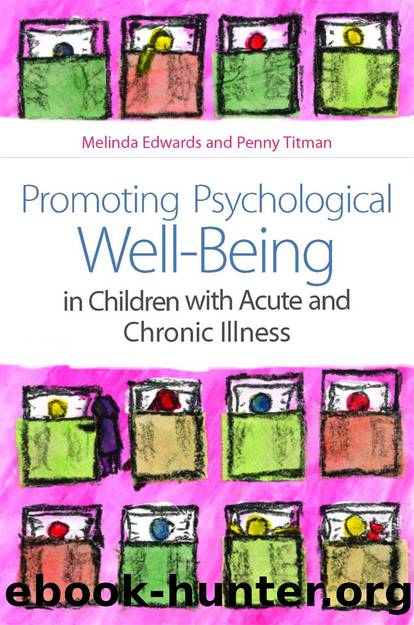Promoting Psychological Well-Being in Children with Acute and Chronic Illness by Edwards Melinda;Titman Penny;

Author:Edwards, Melinda;Titman, Penny; [Melinda Edwards and Penny Titman]
Language: eng
Format: epub
ISBN: 9780857003959
Publisher: Jessica Kingsley Publishers
Published: 2014-09-04T00:00:00+00:00
CHAPTER 8
Education, School and Peer Relationships
This chapter covers the impact of chronic illness on a childâs education, and the services and systems which can be used to help ensure children with medical conditions are able to benefit from education to achieve their potential despite their health problems. This includes both academic skills and promoting achievement, and the social needs of the child, including developing good peer relationships.
School plays a very important part in the life of a child and it is one area which is often disrupted by chronic illness. School is essential not just for learning but also because of its important role in supporting social development and promoting a childâs independence. All children should be able to continue with their education despite being unwell, but as each childâs needs do vary, it can be hard to find the ideal form of flexible educational support. Illness can disrupt education in several ways. Children may have to miss school for hospital appointments and admissions or because they are too unwell to come to school. Even if a child is well enough to attend school, they may find it harder to access the full curriculum, because of tiredness or physical difficulties. In addition, they may find it more difficult to integrate fully with their peers, especially if it is hard for them physically to join in activities, but also because of discontinuity due to absences, which disrupts friendship groups. Some medical conditions, particularly those which affect the central nervous system (CNS), such as epilepsy, are also associated with increased rates of general or specific learning difficulties. In addition, some treatments can affect the CNS (e.g. some treatments for cancer), and this can result in specific learning difficulties which are quite subtle and difficult to diagnose.
Current education policy aims to support children wherever possible in mainstream education and to promote inclusion, which emphasises the similarities between children rather than the differences between them. Access to Education for Children and Young People with Medical Needs (DoH/DfES 2001) states: âAll pupils should continue to have access to as much education as their medical condition allows so that they are able to maintain the momentum of their education and to keep up with their studies.â
All schools are required to have a policy to deal with managing education for children with medical needs. They will usually want to draw up a health care plan for any child whose health care needs affect their day-to-day life at school, and this should cover absences from school. If a child is going to be absent because of medical needs for 15 days or more, the local authority (LA) has to be informed and is obliged to provide education of a âsimilar quality and rangeâ to what they would get in school. Creative use of technology, such as the Internet and email, can make it much easier for a child to continue with work set at their own school, even if they are not able to attend school in person.
Download
This site does not store any files on its server. We only index and link to content provided by other sites. Please contact the content providers to delete copyright contents if any and email us, we'll remove relevant links or contents immediately.
The Psychology of Media and Politics by George Comstock & Erica Scharrer(294)
Directions in Technical Writing and Communication by Gould Jay R.;(268)
Behold the Monster by Jillian Lauren(267)
Through Windows of Opportunity : A Neuroaffective Approach to Child Psychotherapy by Marianne Bentzen; Susan Hart(239)
The Hypnotic Coach: A Conversational Hypnotherapy Tool Kit by Marion Jess(228)
Overcoming ADHD Without Medication : A Guidebook for Parents and Teachers by Children and Natural Psychology Association for Youth; Children The Association for Youth(221)
Out of the Mainstream: Helping the Children of Parents with a Mental Illness by Loshak Rosemary;(214)
The Modern Young Man's Guide to Manhood by Wayne Walker(197)
MANIPULATION & MIND CONTROL: The Persuasion Collection: Dark Psychology Secrets, Analyze & Influence People with Nlp. How to learn Reading Friends and Develop Body Language Skills. by ROBERT TOWER(193)
Positive Psychology Across the Lifespan; An Existential Perspective by Piers Worth(183)
Mind Hacking Secrets and Unlimited Memory Power: 2 Books in 1: Learn How to Improve Your Memory & Develop Fast, Clear Thinking in 2 Weeks + 42 Brain Training Techniques & Memory Improvement Exercises by Sharp Scott(176)
Delphi Collected Works of Sigmund Freud (Illustrated) by Sigmund Freud(171)
Conversational Regression: An (H)NLP Approach to Reimprinting Memories (NLP Mastery) by Marion Jess(168)
Secrets of the Autistic Millionaire: Everything I know about Autism, ASD, and Asperger's that I wish I'd known back then... by David William Plummer(165)
THE PSYCHOLOGY OF ENTREPRENEURSHIP; New Perspectives by Michael M. Gielnik; Melissa S. Cardon; Michael Frese(160)
Zig-Zag Boy by Tanya Frank(154)
Detox Our Brain: 10 Strategies for Brain Health and Wellness by Lucas Sacha(151)
The Rise of Autism by Ginny Russell(139)
Mind-Blowing Orgasms Every Day: 365 Wild and Wicked Ways to Revitalize Your Sex Life by Cynthia Gentry(138)
